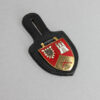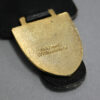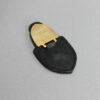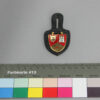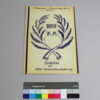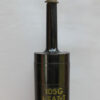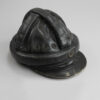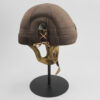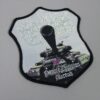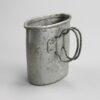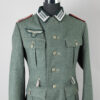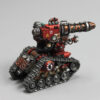Chest pendant of the German Armed Forces
Inventory number: DPM 3.15
For many soldiers, the Bundeswehr insignia is a symbol of identity that they like to display. For example, in addition to the unit badge on the sleeve, an internal unit badge can be worn, which is an emblem attached to a leather tab and worn in the buttonhole of the right breast pocket. Unlike most Bundeswehr insignia and uniform elements, these so-called chest pendants have no model from earlier German armed forces. They were probably adopted from NATO partners such as France, Belgium or the Netherlands. They only became modern in the Bundeswehr in the 1980s. Chest pendants exist for almost all units, brigades and battalions and must be officially confirmed.
The insignia of the Panzerartilleriebataillon 177 shows in its three parts a reference to the coat of arms of Schleswig-Holstein, the coat of arms of the city of Hamburg and two crossed artillery barrels. The battalion was formed in 1959 as Field Artillery Battalion 177, renamed Panzer Artillery Battalion in 1967 and disbanded in 1993. As part of Panzergrenadierbrigade 17 in Hamburg-Rahlstedt, the battalion should actually have been given the number 175. As part of Army Structure 2 in 1959, the units were each given their own classification numbers by which their affiliation could be recognized, with the final number 5 reserved for tank artillery battalions. Like the coat of arms, the number of the respective battalion is part of the unit’s identity, which is why they are often referred to by their number. The battalion would therefore have been called “die 175er”.
However, this was considered misleading in the Bundeswehr: for a long time, a “175er” meant a homosexual man. The phrase refers to Paragraph 175 of the German Criminal Code, which was still in force at the time and was first listed in the Imperial Criminal Code in 1872. It described homosexual acts between men as “unnatural fornication” and made them a punishable offense. Even in the Federal Republic of Germany, many men were still convicted on the basis of this paragraph. Amended in 1969 and 1973, the paragraph was only finally repealed in 1994. Until the 1980s, homosexuals could be excluded from the Bundeswehr “for health reasons”. Until the end of the 1990s, homosexuality was still an official reason for professional discrimination in the Bundeswehr. However, the fight for equal rights continues to this day. In 2002, the association “Arbeitskreis Homosexueller Angehöriger der Bundeswehr” was founded, which, according to its statutes, represents the interests of homosexual, bisexual, transgender, intersex and differently gendered members of the Bundeswehr and campaigns for equal rights, equality and the elimination of discrimination against these groups in the German armed forces.
Object of the month
(short) stories from the depot
Unfortunately, many objects cannot currently be shown in the exhibition for conservation reasons. Here you will find unusual objects and exciting stories of special pieces from the depot


